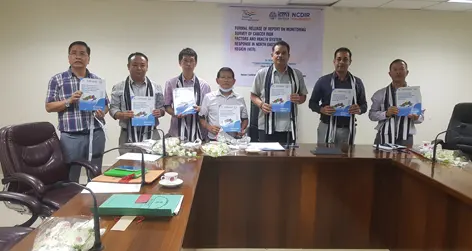NAHARLAGUN, 20 Jul: A report on Monitoring Survey of Cancer Risk Factors and Health System Response in North East Region which was formally released has given several recommendations for reduction of cancer cases in the state. It has recommended reduction in use of tobacco and alcohol, policy implementation for risk factor control, early detection and screening and health system strengthening.
National Centre for Disease Informatics and Research (NCDIR) director Dr. Prashant Mathur expressed concern over the very high rate of cancer incidence in Arunachal Pradesh and said that the survey was conducted to provide policy makers, decision makers, advocates and society on what is fueling the cancer burden in the state.
He further said, “Unless we do not reduce the risk factors and other exposures drastically cancer incidence will not go down in coming years.”
He also put forward three recommendations to govt. of Arunachal Pradesh – to notify cancer as notifiable disease, work closely with cancer registries as part of cancer intelligence system in the state thus, strengthening the cancer registries
through state investment will go a long way in collecting and analysing the cancer data timely and strengthening of Secondary and Tertiary Health Care Services within the state to reduce treatment seeking outside the state.
Health & Family Welfare principal secretary Dr. Sharat Chauhan emphasized on the need to change lifestyle and eating habits in addition to reduction in addiction to tobacco and alcohol. “The habit of consuming smoked and fermented foods and living beside the fireplace with smoke may not be possible to change overnight and report of such study may convince the mass to change their behavior and lifestyle,” he said.
Dr. Chauhan assured to consider the three recommendations suggested by Dr. Prashant Mathur.
TRIHMS director Dr. Moji Jini spoke on the need to have more such research projects with the involvement of faculty and the students of TRIHMS in future.
Health services director Dr. M Lego, medical education training & research director Dr. H. Ambing and cancer control programme nodal officer Dr. ShyamTsering also attended the event.

